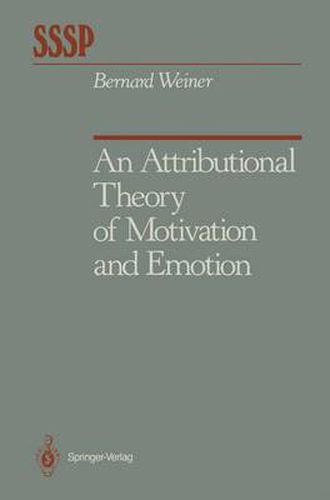Readings Newsletter
Become a Readings Member to make your shopping experience even easier.
Sign in or sign up for free!
You’re not far away from qualifying for FREE standard shipping within Australia
You’ve qualified for FREE standard shipping within Australia
The cart is loading…






This title is printed to order. This book may have been self-published. If so, we cannot guarantee the quality of the content. In the main most books will have gone through the editing process however some may not. We therefore suggest that you be aware of this before ordering this book. If in doubt check either the author or publisher’s details as we are unable to accept any returns unless they are faulty. Please contact us if you have any questions.
For a long time I have had the gnawing desire to convey the broad motivational sig nificance of the attributional conception that I have espoused and to present fully the argument that this framework has earned a rightful place alongside other leading theories of motivation. Furthermore, recent investigations have yielded insights into the attributional determinants of affect, thus providing the impetus to embark upon a detailed discussion of emotion and to elucidate the relation between emotion and motivation from an attributional perspective. The presentation of a unified theory of motivation and emotion is the goal of this book. My more specific aims in the chapters to follow are to: 1) Outline the basic princi ples that I believe characterize an adequate theory of motivation; 2) Convey what I perceive to be the conceptual contributions of the perspective advocated by my col leagues and me; 3) Summarize the empirical relations, reach some definitive con clusions, and point out the more equivocal empirical associations based on hypotheses derived from our particular attribution theory; and 4) Clarify questions that have been raised about this conception and provide new material for still further scrutiny. In so doing, the building blocks (if any) laid down by the attributional con ception will be readily identified and unknown juries of present and future peers can then better determine the value of this scientific product.
$9.00 standard shipping within Australia
FREE standard shipping within Australia for orders over $100.00
Express & International shipping calculated at checkout
This title is printed to order. This book may have been self-published. If so, we cannot guarantee the quality of the content. In the main most books will have gone through the editing process however some may not. We therefore suggest that you be aware of this before ordering this book. If in doubt check either the author or publisher’s details as we are unable to accept any returns unless they are faulty. Please contact us if you have any questions.
For a long time I have had the gnawing desire to convey the broad motivational sig nificance of the attributional conception that I have espoused and to present fully the argument that this framework has earned a rightful place alongside other leading theories of motivation. Furthermore, recent investigations have yielded insights into the attributional determinants of affect, thus providing the impetus to embark upon a detailed discussion of emotion and to elucidate the relation between emotion and motivation from an attributional perspective. The presentation of a unified theory of motivation and emotion is the goal of this book. My more specific aims in the chapters to follow are to: 1) Outline the basic princi ples that I believe characterize an adequate theory of motivation; 2) Convey what I perceive to be the conceptual contributions of the perspective advocated by my col leagues and me; 3) Summarize the empirical relations, reach some definitive con clusions, and point out the more equivocal empirical associations based on hypotheses derived from our particular attribution theory; and 4) Clarify questions that have been raised about this conception and provide new material for still further scrutiny. In so doing, the building blocks (if any) laid down by the attributional con ception will be readily identified and unknown juries of present and future peers can then better determine the value of this scientific product.